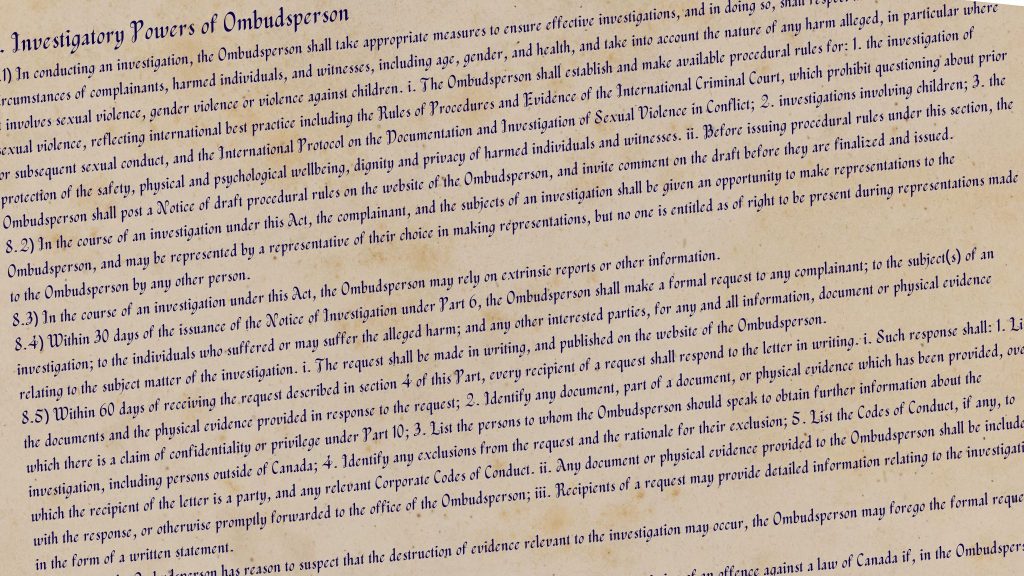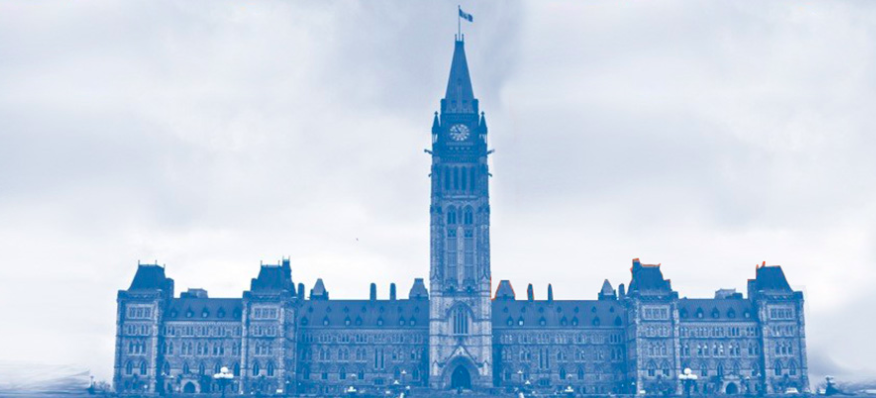Executive summary of the CNCA's draft model legislation to create a human rights ombudsperson for the international extractive sector in Canada, the Global Leadership in Business and Human Rights Act
November 2016
Introduction
Canada is a global leader in the oil, gas and mining sector and is home to more than half the world’s mining companies. However, Canadian companies’ overseas operations are often associated with credible accusations of human rights abuse and environmental damage including forced labour, sexual violence, forced displacement and failure to respect the right of Indigenous peoples to free, prior and informed consent. Those who are harmed often lack access to effective redress. Existing mechanisms in Canada have not been effective in providing redress to impacted individuals and communities. They lack the confidence of stakeholders.
For over a decade, Canadians have been calling on their government to take action on reports of systematic human rights abuse and environmental damage linked to Canadian oil, gas and mining projects around the globe. Since 2013, over 100,000 Canadians have joined the Open for justice campaign. Over 50 Canadian civil society organizations are signatories to a statement echoing this call. Directly-impacted people and communities have testified before parliamentary committees and have met with Canadian Members of Parliament from all parties. In 2015, the Liberal Party of Canada, New Democratic Party of Canada, Green Party of Canada and Bloc Quebecois took an important step forward – each committing to implement concrete measures to enhance corporate accountability for Canadian extractive companies operating abroad.
Developments internationally provide further impetus for Canadian action. The United Nations ‘Protect, Respect, and Remedy’ Framework on Business and Human Rights, and the Guiding Principles to that framework, confirm the legal obligation of states to respect, protect and fulfill human rights. This duty includes the obligation to provide access to remedy for the victims of human rights abuse. Canada has thus far failed to fulfill these legal obligations. This year, the UN Human Rights Committee joined other international authorities in calling on Canada to ensure that its corporations, particularly those in the mining sector, respect human rights standards when operating abroad. A letter to Prime Minister Trudeau signed by over 200 organizations from around the world confirms both the urgency and the global attention on Canada.
An effective and credible ombudsperson office will provide important long-term benefits to Canadian extractive companies. Extractive projects frequently create conflict and result in community grievances. When the underlying issues are not addressed fairly and quickly, conflict escalates and companies risk significant operating delays and interruptions with serious financial repercussions. Conflicts that create negative images and publicity for companies become significant liabilities not only for the companies involved but for the entire industry as it seeks to negotiate with rights holders for access to new raw material deposits. The absence of a credible, impartial and independent oversight mechanism exacerbates the problem. A robust system of corporate accountability, with a Canadian human rights ombudsperson as its cornerstone, would contribute to a more stable and predictable operating environment where the responsible business practices of Canadian companies are recognized and rewarded.
Much of the world is open for Canadian business. Canada now has an unprecedented opportunity to show leadership and to make Canada open for justice.
The CNCA commissioned the drafting of model legislation to create an extractive-sector ombudsperson based on established legal principles and procedures. The model legislation includes robust procedural protections both for companies under investigation and complainants. It also includes protections that respond to the particular vulnerabilities of complainants. Further, it includes measures designed to ensure the independence and credibility of the ombudsperson office. The draft model legislation provides for the effective and transparent investigation of complaints; clear investigatory procedures; public reporting; procedures for recommendations; the option of mediation; and measures to monitor the implementation of recommendations. The draft model legislation creates a non-judicial grievance mechanism to investigate allegations of harm associated with Canadian mining, oil and gas projects overseas and of failure to respect international human rights and environmental standards.
Purpose of the Ombudsperson Office
The objects of the model legislation, as set out in Part 3 Section 20, are to:
- increase accountability and transparency in the extractive sector;
- promote gender sensitive investigation, reporting, and resolution of harm;
- promote remedy and reparations for harm and avoidance of harm;
- and promote meaningful participation by affected individuals and groups.
An office that can effectively investigate complaints of harm related to overseas Canadian mining, oil and gas projects
If a person or community believes they have or will suffer harm in relation to a Canadian oil and gas or mining project overseas, they can bring a complaint to the ombudsperson for investigation. Complaints can be made by any person, organization, or group of individuals, and can be made at any time [Part 4].
The ombudsperson is required to investigate all complaints that allege harm (defined as an infringement of the listed international human rights, labour and environmental norms) [Schedule 1], or significant risk of harm, linked to an extractive company that has a nexus to Canada [Part 6]. This would include companies headquartered in Canada, their subsidiaries and affiliates, among others [Part 5 and Part 2 for various definitions]. Multinational companies organize their international affairs in complex ways. Limiting investigation to companies headquartered in Canada would not reflect the current reality of how international businesses are structured and operate. The ombudsperson can decline to investigate a complaint if he/she is of the opinion that the matter is trivial or not serious, that it has or is being effectively dealt with in another proceeding or if the ombudsperson is of the opinion that the complaint is frivolous, vexatious or not made in good faith [Section 6.4]. The ombudsperson must provide reasons for not investigating [Section 6.5]. The ombudsperson can also undertake investigations on his/her own motion if she/he suspects there is a significant risk of harm or that harm has occurred [Section 6.3].
Before initiating an investigation, the ombudsperson publicly notifies the parties (with limited exceptions) [Sections 6.8-6.11]. Within 30 days of that notice, the ombudsperson issues a formal request “for any and all information, document or physical evidence relating to the subject matter of the investigation” [Section 8.4]. Parties must provide information (actual documents, lists of evidence, indicate who else may have relevant information, etc.) within 60 days of that request. Parties can request that anything they provide be kept confidential [Section 8.5]. There are specific provisions to guide the ombudsperson in assessing such requests, including possible review by the Federal Court [Part 10].
The ombudsperson has specialized expertise and will develop procedures for effective investigations of alleged international human rights, labour and environmental abuses [Sections 3.9 and 8.1]. In carrying out his/her investigation, the ombudsperson will give the opportunity to the complainant(s) and any companies involved to make representations, with or without a representative of their choice and the ombudsperson can review external reports. No one has a right to be present when representations are made by others [Sections 8.2 and 8.3].
If the ombudsperson believes a company or person has information, documents or data in their possession or control that would help further the investigation that has not been provided in response to the ombudsperson’s request, the ombudsperson can apply to a justice for 1) a production order requiring that a party provide the ombudsperson with (a copy or original of) the specified document(s) or data, 2) an order to participate in an investigative interview (possibly before the judge or under oath), or 3) a search warrant for a building, receptacle or other place [Sections 8.9-8.15].
Many Canadian ombudsperson offices have the power to compel testimony and the production of documents without needing to seek a court order to that effect [i.e. Information Commissioner of Canada and Privacy Commissioner of Canada]. The extractive-sector ombudsperson would be required to get a justice to approve the order as a way of enhancing the procedural protections afforded to companies subject to a complaint.
Several conditions need to be met in order for a justice to make one of the above orders.
The justice must be satisfied that there are reasonable grounds to believe that harm has or may be committed and that evidence for the investigation or relating to the harm will be afforded by the order [Sections 8.9-8.15]. For a production order, the justice must also be satisfied that the documents or data are in the possession or control of the party [Section 8.10]. For an interview order, the justice must also be satisfied that reasonable attempts have been made to gather the information by other means [Section 8.12].
Where it is not against the rules of the other country to do so, the ombudsperson may gather information in other countries – through mutual assistance agreements, letters rogatory, or similar agreements. To be clear, the ombudsperson won’t participate in law enforcement activities in any other countries [Part 9].
Mediation and Settlement [Part 11]
In some circumstances, mediation could resolve the issues under investigation by the ombudsperson. Mediation can be requested at any time. Given the power-imbalance that often exists between complainant and company, and the public interest in transparency, the ombudsperson will offer mediation only if all parties give informed consent, the complainant is directly affected by the matter and can represent others affected by the harm, the matter under investigation is (in the opinion of the ombudsperson) appropriate for mediation, and the initial investigation has gone far enough to reveal the relevant facts. Parties can be represented during mediation, and the ombudsperson can agree to pay for the reasonable legal expenses of a complainant / group of complainants.
Where the settlement of a complaint is agreed to, made in writing, signed by the parties to the settlement, and approved by the Ombudsperson, the settlement is binding upon the parties to the settlement, and the party alleging breach may apply to the Federal Court for enforcement.
Ombudsperson reports are public, include findings and recommendations and the ombudsperson monitors implementation
The Ombudsperson shall issue a public report with his or her opinion, and the reasons therefor, and may make such recommendations as he or she thinks fit [Sections 13.1 and 13.4]. In forming his or her opinion the ombudsperson can look at international bodies and norms on human rights, corporate accountability, and business and human rights [Section 13.2-13.3]. The ombudsperson does not make findings of guilt or liability.
The ombudsperson may make any recommendation of any kind, to any person, or any agency and body of the Government of Canada, including but not limited to:
- regarding remedy and reparations for the harm done;
- steps to be taken to prevent further / avoid future harm (at this project and/or all operations);
- regarding steps to resolve any conflict arising from the project;
- regarding any acts or omissions of any Canadian government agency or department, or any practice, law or policy on which the act or omission was based, or the need for any practice; and/or
- further investigation by a separate authority or body, as appropriate [Section 13.4].
Anyone who is the subject of a recommendation by the ombudsperson must inform the ombudsperson in writing, within a specified timeframe, of progress they have made in implementing the recommendation. The ombudsperson will then request input from the complainant(s) or other affected parties [Section 13.6]. Within 6 months, the ombudsperson will issue a report on his/her opinion as to the progress made in implementing the recommendations. The ombudsperson will provide a copy of the report to the parties to the dispute, to any relevant bodies or institutions interested in business and human rights, will publish it on their website and in the Canada Gazette, and will cause it to be laid before both Houses of Parliament [Sections 13.7- 13.11].
The ombudsperson can recommend the withdrawal or termination of government support, subsidy, promotion or protection by any government department or agency if the ombudsperson is of the opinion that:
- the recipient of government support is not undertaking all reasonable steps to comply with the terms of a settlement;
- the recipient of government support is not undertaking all reasonable steps to comply with the ombudsperson’s recommendation; or
- the harm done was of such a serious nature that it would be inappropriate for the Government of Canada to support the entity or project under investigation [Part 14].
Any recommendation to withdraw or terminate government department or agency support must be implemented by the government agency or department within a specified time period, unless the government agency or department provides reasons, consistent with the Act, for not implementing it. The Federal Court can be asked to judicially review the reasonableness of any government agency or department’s reasons for non-implementation, should that occur [Sections 14.4-14.5].
Confidence in the office of an Ombudsperson is key to its effectiveness
The proper functioning of an ombudsperson office depends on the confidence of the public in the mandate and structure of the office, and in the qualifications and appointment of the office-holder. This confidence is highly dependent on both the perception of and actual independence from the influence of government and others.
The ombudsperson’s integrity and independence is ensured in this model legislation through:
- Status as an Officer of Parliament [Section 3.2];
- Appointment by the Governor in Council, with support of House of Commons and Senate [Section 3.1];
- Security of tenure – 7 year term with one possible reappointment [Sections 3.3 and 3.4];
- Remuneration fixed at adequate level [Section 3.6];
- Sufficient staffing and budget to engage in effective investigations [Part 3];
- Relevant expertise and knowledge, mandate to develop relevant procedures to ensure rights-based investigation and reporting [Sections 3.9 and 8.1]; and
- Clauses to avoid conflict of interest and for immunities [Sections 3.22-3.24, and Part 15].




